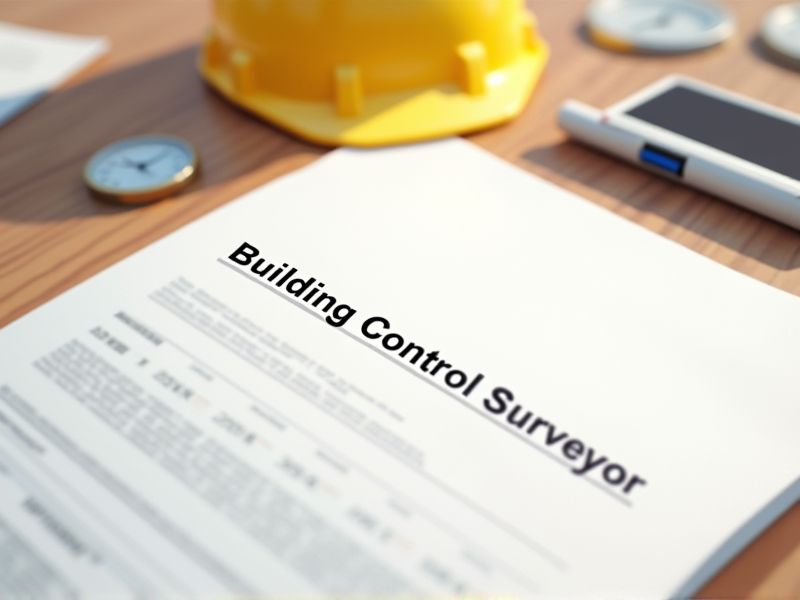
Building Control Surveyors play a pivotal role in ensuring that construction projects comply with building regulations and safety standards. To effectively perform their duties, these professionals must possess certifications that validate their knowledge and understanding of legal, technical, and environmental aspects. Certifications serve as an assurance of competency, enabling surveyors to assess building projects accurately and confidently. Essential certifications for Building Control Surveyors include those that cover construction regulations, safety protocols, and environmental compliance.
RICS APC (Assessment of Professional Competence) Accreditation
RICS APC Accreditation ensures that a Building Control Surveyor possesses the necessary competencies and industry standards required for professional practice. This accreditation helps in maintaining public trust and confidence by assuring that surveyors are well-versed in current building regulations and safety protocols. It also enhances career prospects by providing a globally recognized credential that distinguishes certified professionals in the competitive field of building control. Organizations benefit from employing RICS-accredited surveyors as it reduces the risk of non-compliance and promotes consistency in building assessments.
CIOB Chartered Membership Certification
The CIOB Chartered Membership Certification validates the professional competence of a Building Control Surveyor, enhancing their credibility in the construction industry. This certification aligns their practice with international standards, offering assurance to clients and employers regarding their expertise. Holding this certification often leads to better career prospects and higher earning potential due to the recognized proficiency it embodies. In a regulatory environment increasingly focused on safety and standards, possessing such a certification can provide a competitive edge in the field.
Construction Skills Certification Scheme (CSCS) Card
The CSCS card is essential for a Building Control Surveyor because it validates the individual's competency in relevant construction skills and safety knowledge. Lack of proper credentials can lead to increased workplace accidents, as knowledge gaps might exist in identifying potential hazards. Legal and insurance obligations often require professionals on-site to hold a CSCS card, ensuring compliance with industry standards. Employers rely on the card to assure that surveyors meet national benchmarks, enhancing overall project credibility and client trust.
NEBOSH National General Certificate in Occupational Health and Safety
The NEBOSH National General Certificate provides Building Control Surveyors with comprehensive knowledge of health and safety legislation, essential for ensuring compliance in construction projects. When construction sites adhere to these safety standards, the likelihood of accidents and injuries decreases, promoting a safer work environment. Surveyors equipped with NEBOSH certification can effectively identify and mitigate potential risks, which contributes to overall project efficiency and reduces downtime. Employers value the certification, as it signifies the surveyor's expertise in maintaining regulatory compliance and enhancing workplace safety culture.
PASMA Working at Height Certification
Building Control Surveyors oversee construction projects to ensure compliance with safety regulations, and the PASMA Working at Height Certification provides essential knowledge about safe practices when working at heights. The certification helps surveyors recognize and mitigate potential fall hazards, reducing the risk of accidents on-site. Gaining this certification enhances a surveyor's credibility and demonstrates a commitment to workplace safety standards. Improved understanding and compliance with safety regulations can lead to fewer project delays and lower liability for construction firms.
BREEAM Accredited Professional Certification
BREEAM Accredited Professional Certification equips a Building Control Surveyor with specialized knowledge to ensure sustainable building practices. This certification enhances the surveyor's ability to recommend and implement environmental-friendly techniques, leading to improved building efficiency. With this credential, surveyors can better guide projects towards achieving BREEAM ratings, which are increasingly demanded by stakeholders. Having the certification often results in regulatory compliance and aligns building projects with contemporary green standards.
LEED Accredited Professional Certification
LEED Accredited Professional Certification equips a Building Control Surveyor with a comprehensive understanding of sustainable building practices, which can lead to more environmentally responsible construction oversight. This certification demonstrates a surveyor's commitment to green building standards, potentially enhancing their credibility and marketability in the industry. With LEED expertise, a surveyor can effectively evaluate and ensure compliance with green construction guidelines, which is increasingly critical as more jurisdictions implement sustainable building codes. Furthermore, possessing LEED accreditation often increases a professional's opportunities to work on high-profile projects that prioritize sustainability initiatives.
NVQ Level 6 in Building Surveying
The NVQ Level 6 in Building Surveying provides in-depth knowledge on building regulations, essential for a Building Control Surveyor's role in ensuring construction compliance. This qualification enhances the surveyor's ability to assess structural integrity and safety, reducing potential construction failures. Knowledge from this NVQ equips surveyors with the skills to critically evaluate materials and methods, promoting sustainable building practices. Employers often demand this certification to ensure their surveyors can proficiently manage complex inspection and approval processes.
Approved Inspector Accreditation
Approved Inspector Accreditation is essential for Building Control Surveyors to ensure compliance with national building regulations, which promotes safe and sustainable construction practices. This accreditation provides an assurance of competence, validating that the surveyor possesses the necessary skills and knowledge to effectively evaluate building projects. When surveyors are accredited, it increases public trust and confidence in the construction process, reducing the likelihood of project delays or failures. Moreover, it standardizes practices across the industry, contributing to consistent quality and safety in the built environment.
First Aid at Work Certification
Building control surveyors often work on construction sites where accidents can happen, so a First Aid at Work Certification ensures they can respond effectively to emergencies, minimizing harm. Regulations and safety standards frequently mandate the presence of certified first aid personnel, and surveyors need to comply with these requirements. Possessing first aid knowledge enhances a surveyor's ability to assess and mitigate potential safety risks, contributing to overall site safety management. Trained surveyors can also offer immediate assistance, reducing downtime and supporting continuous workflow during minor incidents.
Summary
As a Building Control Surveyor, obtaining certifications can significantly enhance your credibility and expertise. This can lead to increased trust from clients and peers, resulting in more project opportunities. Enhanced qualifications often align with higher salary prospects and career advancement. Certifications ensure you stay updated with the latest regulations, thereby reducing errors and improving project compliance.
